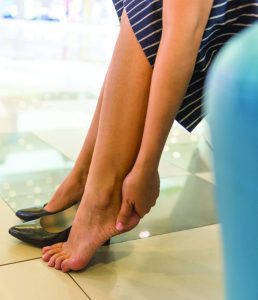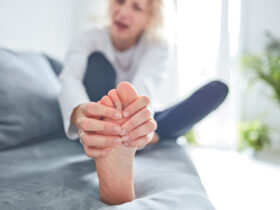Dr. Jamie E. Weaver, DPM – Foot and Ankle Surgeon
 One of the most common reasons that patients visit their physician is for heel pain. Our feet bear the weight of the
One of the most common reasons that patients visit their physician is for heel pain. Our feet bear the weight of the
entire body and if you are overweight, which is typical for many individuals with heel related discomfort, your feet and ankles are the most common areas injured due to tiny tears or sprains.
The foot is comprised of many different bones, joints, tendons, and ligaments these include the plantar fascia. The plantar fascia is a band of fibrous, elastic tissue similar to ligaments. It stretches from the heel of your foot to the toes, and it is responsible for supporting your arch.
Plantar fasciitis is inflammation or injury to the plantar fascia. This is one of the most common foot disorders; in fact, one in ten people will experience plantar fasciitis at some point in their life. Usually, the pain is concentrated in the heel area, and it is generally caused by tiny injuries that occur over an extended period of time.
There are several different types of plantar fasciitis issues, these include:
• Tears
• Ruptures
• Sprains
• Heel spurs
With Plantar fascia tears, tiny tears shred the ligament over time. These small rips can be quite painful and unfortunately are difficult to heal on their own since so much weight and pressure are on the foot each day.
Ballistic movements through exercise and sports-related activities typically cause plantar fascia ruptures. The ruptured fibers tear completely through the fascia, creating either a partial, or total torn ligament. This usually requires minimally invasive surgery.
Sprains are when the fibers are twisted or stretched beyond the average capacity, and the tissues are not torn or ruptured, but yet they are painfully extended out of their normal range. Sprains typically can be treated with rest, elevation and various compression and bandages until the fibers are retracted back into their normal state.
Heel spurs are deposits of calcium that form into a protrusion or projection of boney material. On their own, these spurs cause little to no pain, but when individuals with plantar fasciitis have heel spurs; they often cause a great deal pain. More than half of patients with plantar fasciitis will also suffer from heel spurs.
Although the pain scale can run from minimal to excruciating with heel discomfort and issues, the distinctive treatment is usually kept to a minimum to get you back on your feet. Most podiatrists will recommend the RICE method, which is a combination of rest, ice, compression and elevation. Arch supports and orthotic shoes are a great way to stabilize the plantar fascia, pain management can be introduced with NSAID’s (ibuprofen), or corticosteroid injections to alleviate and lessen any soreness. Physical therapy is often recommended along with at home instructions to stretch and improve flexion and function. Surgery is of course always the last resort, but often, it is the most efficient way to repair the footbed and eliminate future ruptures or tears.
Keeping your feet healthy is critical to staving off pain and remaining in control of your daily activities. As we age, our feet are more susceptible to injury.
Jamie Weaver, DPM
Foot and Ankle Surgeon
Dr. Jamie Weaver provides comprehensive orthopaedic care as a podiatric specialist in Foot and Ankle Surgery. Along with all podiatric procedures, she is an expert in treating plantar fasciitis. Being a firm believer in patient education, Dr. Weaver prides herself on taking the time to educate her patients on diagnosis, treatment plans, and options, as well as patient expectations.
Dr. Weaver’s motto is; Well-informed patients equal positive and predictable outcomes.
Dr. Jamie Weaver completed her residency training program at San Francisco Bay Area Foot and Ankle Program affiliated with Kaiser Permanente and University California San Francisco. Starting her private practice career in Southwest Florida, Dr. Weaver has distinguished herself as a physician offering complete patient care with state of the art treatment modalities and surgical techniques. Dr. Weaver primary goal is to keep her patients’ pain-free and active.
To find out more, please visit Jointreplacementinstitute.com, or to schedule your appointment, please call (239) 261-2663









